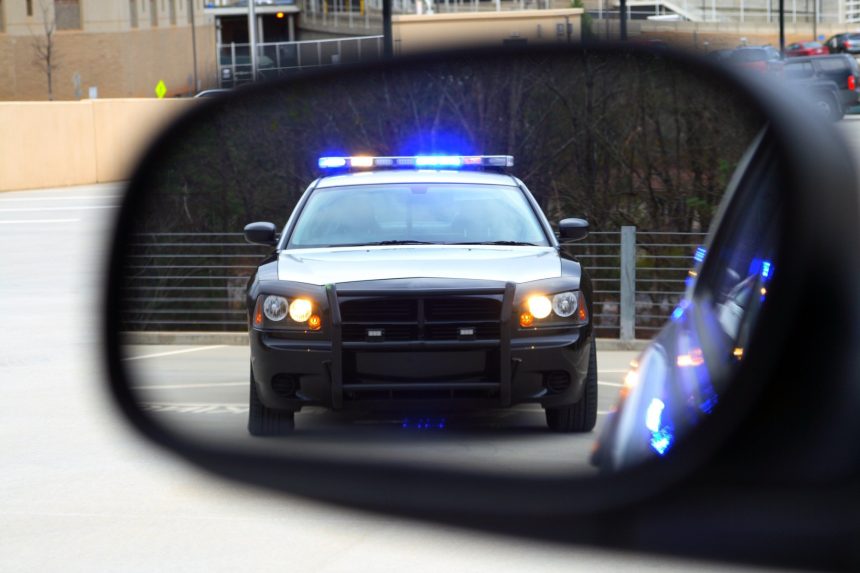How many traffic stops happen in the United States every year?
The number is close to 32 million!
Officers are here to protect and serve, but that doesn’t mean they have your best interest at heart. It’s not uncommon for police officers to try to use manipulative traffic stop tactics, in hopes that you’ll incriminate yourself. Luckily, by learning how to behave when you’re pulled over by police, you can avoid a world of legal trouble.
What are the dos and don’ts for interacting with police officers during a traffic stop? Read on to find out!
Being Pulled Over by Police at Night
Let’s say, it’s nighttime and you see sirens and lights in your rearview mirror. The moment you realize that an officer is pulling you over, you need to start looking for a safe spot to stop. It’s best to pull over immediately, at the closest right-hand edge of the road.
However, in some situations pulling over immediately isn’t going to be the safest option. For instance, perhaps there isn’t space on the side of the road, or you’re on an especially busy roadway.
Around 50% of fatal car accidents happened at night. If you feel your safety is in jeopardy, begin driving slower as you start to search for the safest spot to stop. Focus on breathing in and out, and paying attention to the road. Don’t start fumbling with your phone, or trying to move things in your vehicle as you look for your pullover spot.
After you stop your car, don’t start moving again. The position you stop in is the position you should stay in until the police officer permits you to leave. Simply put your hands on the steering wheel, and wait as the officer begins to approach your vehicle.
Waiting for Police Officer to Approach
After being pulled over by police, remember to continue focusing on inhaling and exhaling fully. By deeply breathing, it’ll be easier for you to stay calm throughout the encounter. If it’s nighttime, and you can easily do so, go ahead and turn on your vehicle’s interior light.
Next, follow whatever directions the officer gives you. For instance, the police officer might ask to see your license and registration, or they may ask you to step out of the vehicle.
As a general rule of thumb, being polite and patient is the best way to deal with the police. You don’t have to be overly nice or try to make them feel good, simply show them respect. By keeping emotions out of the equation, you’ll be able to make the best decisions so you can have the best possible outcome.
If at any point the police officer asks you to do something or tells you something, and you don’t understand, ask for clarification. Just because you’re being polite and patient, doesn’t mean you can’t be firm and professional as well. Ask for clarification about the directions the officers are giving you, and take the time to listen to their answer.
Lastly, if the police officer gives you a citation, take it.
You might not agree with the citation, however, now is not the time to argue. Instead, take the citation, and reach out to your attorney about the best way to proceed. Simply accepting a citation is not an admission of guilt, and you’ll still have the chance to contest the ticket in court.
Getting Pulled Over for DUI
Moving on, let’s go over the dos and don’ts for getting pulled over by the police if you’ve been drinking. For starters, always stay calm, and act as normal as possible. Now’s not the time to show strong emotions, or appear disoriented in any way.
As you pull over for the officer, use your turning signal, and come to a complete stop. Keep in mind that as the officer approaches your vehicle, everything is being recorded, including how you were driving immediately before the stop took place.
Next, as we mentioned earlier stay polite and be professional when you’re talking to the police. You don’t want anyone who watches the video later on, to feel that you were unreasonable, rude or behaving drunk in any way.
Instead, you’ll be putting yourself in the best position possible if you stay polite and professional. Refer to the officer as Sir or Ma’am, and at no point try arguing with them.
Don’t Incriminate Yourself
Next, don’t incriminate yourself. You shouldn’t admit to drinking, even if you’ve only had 1 or 2 drinks, and it was hours ago.
Remember, you don’t have to answer all of the officer’s questions. You do however have to give the officer your driver’s license, registration, and car insurance details, if asked.
If the officer asks you, “how many drinks have you had today?”. You don’t have to answer that question. Instead, stay silent.
The conversation is being recorded, and if you say something about drinking, even if you only admit to having one drink, it can be used against your court. It doesn’t even matter if you’re not impaired at the time of the traffic stop.
What should you do if you accidentally admit to drinking? If you accidentally let it slip that you’ve had a couple of drinks, there’s still hope.
Know Your Rights
It’s not illegal to have a drink, sober up completely, and drive your vehicle. As long as your BAC isn’t above the legal limit, and you have a clear mind, you’ll be good to go.
However, officers don’t ask specific questions about your state of mind. Instead, they keep things vague by simply asking whether or not you’ve been drinking.
If you admit you’ve been drinking, the court can then decide that you were drinking and driving and should be punished. However, if you accidentally let it slip that you’ve been drinking, you can save the situation by getting specific.
After telling the officer that you have been drinking, tell them what kind of alcohol you had to drink, and when you drank it. Also, include whether or not you had anything to eat with it.
Let’s say, you had one beer, five hours ago, and with a meal. If you state all of those facts for the officer’s body cam, it’ll help prove your case in court. You can argue that while you did drink, you did not drink and drive impaired.
Immediately after being charged with A DUI, you’ll want to secure an experienced DWI lawyer. Often a reputable lawyer will be able to minimize the impact of the charges or get them thrown out completely!
Mistakes to Avoid When Talking to Police
Moving on, let’s talk about some of the top mistakes to avoid if you’re pulled over for reckless driving. Depending on the state you live in, reckless driving can be defined in several ways. Oftentimes, it’s considered driving habits that don’t regard the safety of others or yourself. A great example of reckless driving in most states would be speeding.
How Much Is a Reckless Driving Ticket?
How much is a reckless driving ticket? The cost can vary depending on the type of traffic violation you committed. For example, a reckeless driving ticket for going 5 miles over the speed limit is going to be a lot less than being cited for going 25 miles too fast.
Let’s pretend that you were speeding through a rural neighborhood, and an officer starts to pull you over. After finding a safe place to pull over, you put your hands on the wheel and wait for the cop to approach her car.
When the police officer approaches your car, they ask for your license and registration. However, that’s not the only question they ask. The officer also starts asking you if you knew how fast you were going, and why you were speeding.
Should you answer these questions? Absolutely not! Saying something seemingly innocent like, “I think I was going 1 mile over?”, is still admitting that you’re speeding. Your citation will be much more difficult to fight, since you just incriminated yourself.
Remember, the police officer has the right to ask you questions about your license or registration, but not about your driving habits. It’s completely within your right to let the officer know that you do not want to answer questions that don’t relate to your license, insurance, or registration.
Stay Safe Out There
We’re happy to know that if you do get pulled over by police, you’ll know exactly how to handle the situation. Remember that staying calm and polite is the best approach for interacting with police officers. If at any time you feel an officer has treated you unfairly, or the ticket was unwarranted, reach out for legal help.
By hiring a trusted attorney, you’ll be able to stand up for your rights, and possibly avoid hefty fines. Are you ready to learn more life tips like the ones in this article? Take a moment to explore more of this site.













![stampede-at-soleimani-funeral-in-kerman-kills-dozens-[video]](https://thenewsgod.com/wp-content/uploads/2020/01/13926/stampede-at-soleimani-funeral-in-kerman-kills-dozens-video-330x220.jpg)

